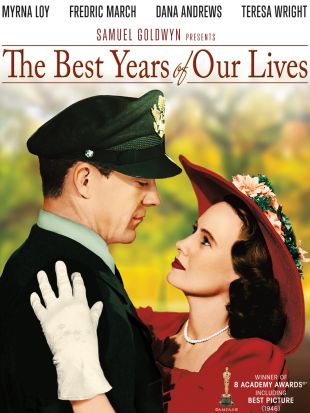
When Samuel Goldwyn decided to make The Best Years of Our Lives, Hollywood was running away from World War II-related scripts as though the subject itself had the plague -- movies about men in uniform had been box-office poison since early 1945. The assumption was that returning veterans would be even less willing than those who'd stayed on the home front to shell out money to be reminded of their service. Goldwyn, director William Wyler, and screenwriter Robert E. Sherwood (working from MacKinlay Kantor's blank verse novel Glory for Me), and a cast from heaven (some of them, like Dana Andrews and Virginia Mayo, giving the greatest performances of their careers) proved the industry wrong, and they opened up a whole new subject area by focusing on the men giving up their uniforms, the women and children around them, and even the men who hadn't served. They ended up with a 170-minute movie whose every shot was dramatically and psychically spellbinding, embracing the relief, anxiety, pain, joy, and doubts that Americans could now express. The setting of the movie in a small city somewhere in the middle of the country gave it a Norman Rockwell veneer, while the script melded that background with some healthy cynicism and emotional honesty borne out of the movie world's new awareness of modern psychology. Thus, the film had its feet in both pre-war and post-war consciousness, appealing to two generations of filmgoers (or even three, as the World War I-era audience was still around and had hardly been served well in its own time). It not only set new standards for maturity in mainstream moviemaking, showing that you could please crowds even as you showed a few unpleasant truths about who and what we were, but also did a lot to ease audiences into the Hollywood era that produced such serious, topical dramas as Gentleman's Agreement, Crossfire, City Across the River, Home of the Brave, The Sound of Fury (aka Try and Get Me), The Wild One, On the Waterfront, and Goldwyn's own Edge of Doom.
